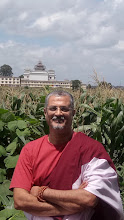Speaking Tree, 13.12.2016, National
Edition:
The other day i read an interview of a successful Indian
tennis player. Answering a question on why training routine is so important,
even practicing during off-season by playing the same shots over and over
again, he said it was to develop ‘muscle memory’. On reading further he
revealed that a memory of such kind acquired by the muscle or set of muscles in
playing a certain kind of shot comes in handy in cliff-hanger situations of a
close game, when there is no time to think and react, but simply react. Rather
than the player’s brain memory, s/he would rely on the built in memory of the
muscle that would sub-consciously follow a particular swing with ease to play
that shot. Such a muscle memory is developed over years by practicing the same
shot tens of thousands of times.
This got me contemplating on what it would be like to
develop the memory of our mind in the spiritual context. Isn’t this what practitioners
of all traditions do or are supposed to do in their meditation sessions? Indeed
yes.
In Buddhist practices, Three Wisdom Tools are handy to the
seeker. They are: listening to the teachings (also reading), contemplating on
them and finally meditating on it. While the first tool is self-explanatory, to
contemplate is basically to debate the subject within ourselves using the
intellect to derive conclusively and finally meditate on the outcome thus
concluded in order to make it our mind stream. This sounds easy but
practitioners spend a life time over it! And yet our mind is merely feather in
a storm, gullible to the omnipresence of powerful seductive phenomena around us,
attracting and distracting all the time.
A proverb in Tibetan says: ‘It takes five times of thorough
study and practice for dharma to travel from skin to the bone marrow’. Clearly
the emphasis is on the dogged pursuit of our practice. It is the repetitiveness
of such meditative sessions, over and over again, that builds our mind memory,
that not only builds moment to moment awareness making us mindful and
thoughtful but also remembering to be aware of something or do something at a
designated time in the future (Pali: sati,
Sanskrit: smrti, Tib: trenpa). With this, we can offer a
response to a situation quite different from our habitual patterns and painful
habits. On the subject of how and why we’re able to control reactions and
emotions during meditation yet fail to do so in real life situations, Dzongzar Khyentse
Rinpoche says “In meditation we notice but don’t do anything about them. In
other situations we don’t do anything about them because we simply don’t notice”.
Building our mind’s memory helps close the gap between ‘noticing’ and ‘doing’. If
meditative sessions can be compared to laboratory trials or practice sessions,
live situations are field trials or real matches.
Oh seeker! Let there be no difference between the two!
